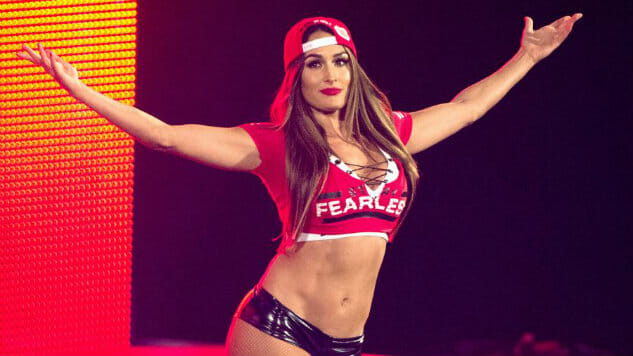WWE’s Sexist ‘Woman vs. Diva’ Problem Remains
Photo Courtesy of WWE.com
It’s been almost one year since the term “Diva” was abolished in WWE, and women employed as wrestlers and on-air talent began to be known simply as women “Superstars.” The move marked WWE stepping away from a sexist and segregational brand name—still used somewhat counterintuitively as the title of their E! reality show, Total Divas—towards a culture where women wrestlers, in theory, are treated more equally.
This should mean wrestling in matches with story arcs and stipulations that correspond, and even rival, that of male Superstars. But with many storylines revolving around men and recent episodes of Monday Night Raw featuring no women’s matches at all, WWE continuously stumbles. It should also mean equality within the women’s division itself, a reality that we’re still approaching.
The abolishment of “Diva” was great, but its ideologies are still there. Women who were hired smack dab in the middle of the “Divas era”, like Nikki Bella and Alicia Fox, are placed in storylines that exemplify this: Fox played the literal trophy for Noam Dar and Cedric Alexander to fight over, displaying little agency in the matter, while Bella’s storylines since returning from a career-threatening neck injury have been about her relationship with John Cena. Upon her recovery, there have been many opportunities to position Bella as overcoming these misconceptions, but WWE instead diminishes her success by playing into the widely-held notion that she’s only in her current position because of her proximity to Cena.
Post-”Diva”, it’s the “actual” women wrestlers—who had the good fortune of coming up through NXT under the tutelage of Triple H, someone who seems to care about the division—who get high-stakes championship matches with history-making stipulations. Charlotte, Sasha Banks and Bayley are not unjustly rewarded with Hell in a Cell, no-disqualification and Iron Woman matches. But it’s at the expense of women like Fox, Natalya and Naomi, who’ve been toiling away for years, putting on the best matches they could with the scraps they were, and continue to be, given. And though there have been plenty of NXT graduates besides the Four Horsewomen, WWE largely fixates on Charlotte, Banks, Bayley and Becky Lynch, creating yet another hierarchy within the already fractured women’s wrestling division in WWE.
Whether they intended to or not, keeping Total Divas on the air while peddling a “Women’s Revolution” on WWE programming immediately separates the fame-hungry “Divas” from the “serious” women wrestlers. This attitude is perpetuated by the continued perception by the fans that someone like Bella, who has consistently worked on her wrestling skills to become one of the most physically powerful women on the roster, and Eva Marie, who has similarly put in the work, are in WWE “for the wrong reasons.”
Those ideologies are even internalized by women Superstars themselves. Listen to any interview with Sasha Banks and she routinely refers to Total Divas and its cast members with disdain. “There’s always gonna be, so to say, ‘Divas,’” she told the radio show Busted Open during last year’s WrestleMania 32 festivities. “And I’m in a category of ‘wrestlers.’” Banks’ internalized misogyny carries over to her promos as well, looking down her nose at “chicks with no talent who post on Instagram” and calling Dana Brooke “Miss Piggy.” If one of the most celebrated woman wrestlers in (not just recent) history believes only some women are worthy of respect and career advancement, what hope do fans have at dismantling these toxic ideas?
But positioning oneself as “different” from other women, despite also being cissexist, is nonetheless seen as a good thing in WWE. I’ve written about Nia Jax’s damaging gimmick before, as has Ashley Leckwold right here on Paste Wrestling. Countless women have been portrayed this way, such as AJ Lee and even Bayley. Despite the “WWE Universe” embracing Lee for her apparent uniqueness at a time when much of her division was populated by women hired more for their looks than their athletic ability, fans still chanted her partner CM Punk’s name during her matches, indicating that even women positioned as different from and therefore “better than” those other women are winning at a zero-sum game. And as far as WWE still has to go in portraying women wrestlers evenly across the board, fans have a lot of work to do, as well.
Yes, it’s great that WWE is investing in and somewhat diversifying their women’s roster. But WWE needs to cut out the archaic storylines that harken back to the Attitude Era, and purge itself of the idea that there are certain kinds of women deserving of different things, even within an industry that demands physical superiority from all its employees. It’s great that women like Banks and Lynch busted their asses to get where they are. But putting down women who have used the tools at their disposal is antithetical to what WWE is trying to do with its so-called “Women’s Revolution.” It should apply to all women, not just the ones deemed worthy by some arbitrary force.
Scarlett Harris is an Australian writer. You can read her previously published work at her website The Scarlett Woman, and follow her on Twitter at @ScarlettEHarris.







































